Paulo Lopes, GMBA Class of 2016
In
2012, Peter Thiel delivered a course at Stanford about start-ups. Notes
for the course, taken by student Blake Masters, led to a book titled Zero to One by
Thiel and Masters, released September 2014. In 2016, Peter Thiel agreed
to teach a two-week course about start-ups at Tsinghua University in
Beijing.
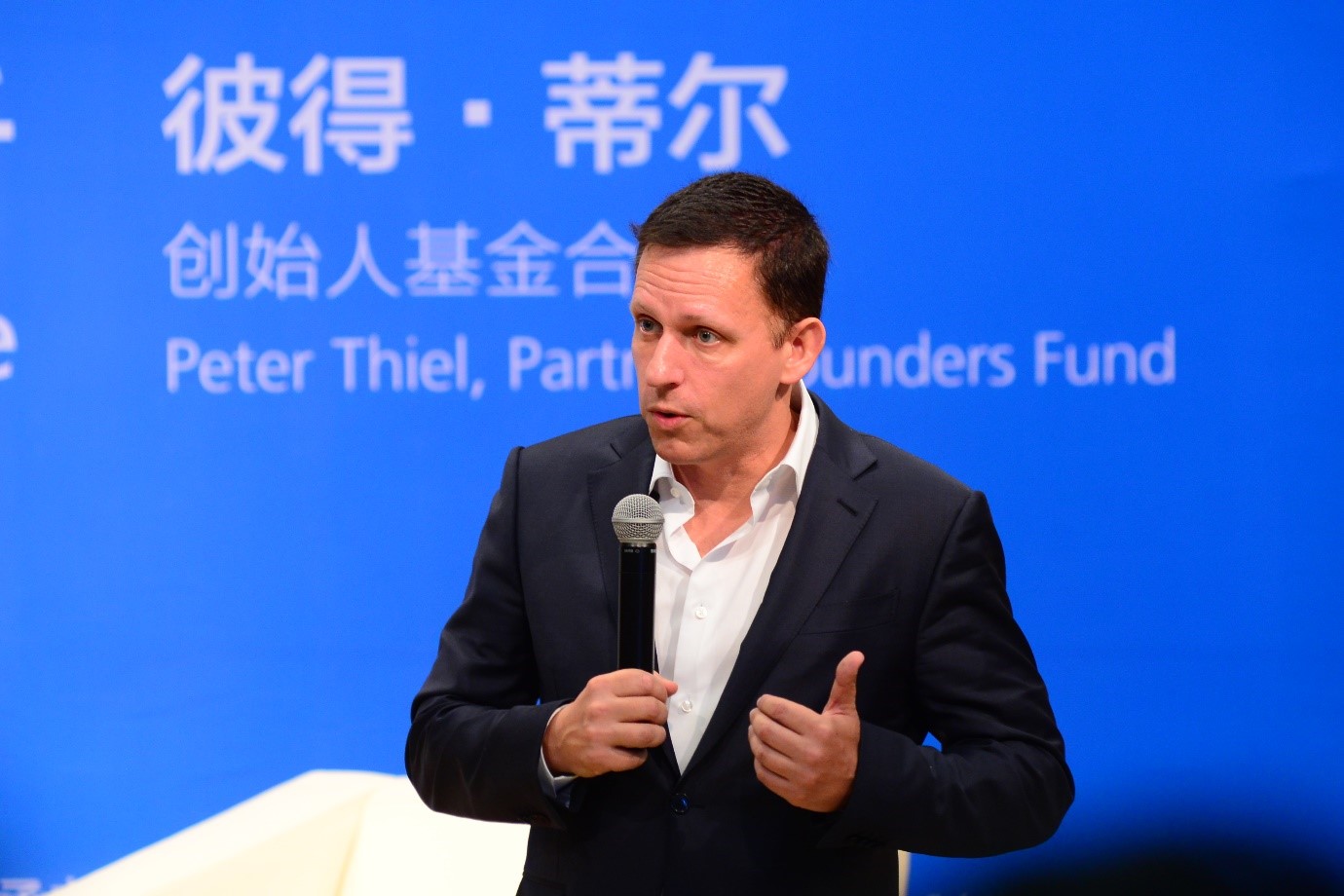
Peter Thiel engages in thoughtful dialogue with Tsinghua SEM Dean Qian.
Mr. Thiel is an American entrepreneur, venture capitalist, hedge fund manager, and social critic. Thiel co-founded PayPal with Max Levchin and Elon Mask and served as its CEO . He also co-founded Palantir. He was the first outside investor in Facebook , with a 10.2% stake acquired in 2004 for $500,000, and he sits on the company's board of directors.
On
March 23, 2016, Mr. Thiel spoke with Tsinghua Business Review and Dean
Qian. The transcript below has been edited for clarity.
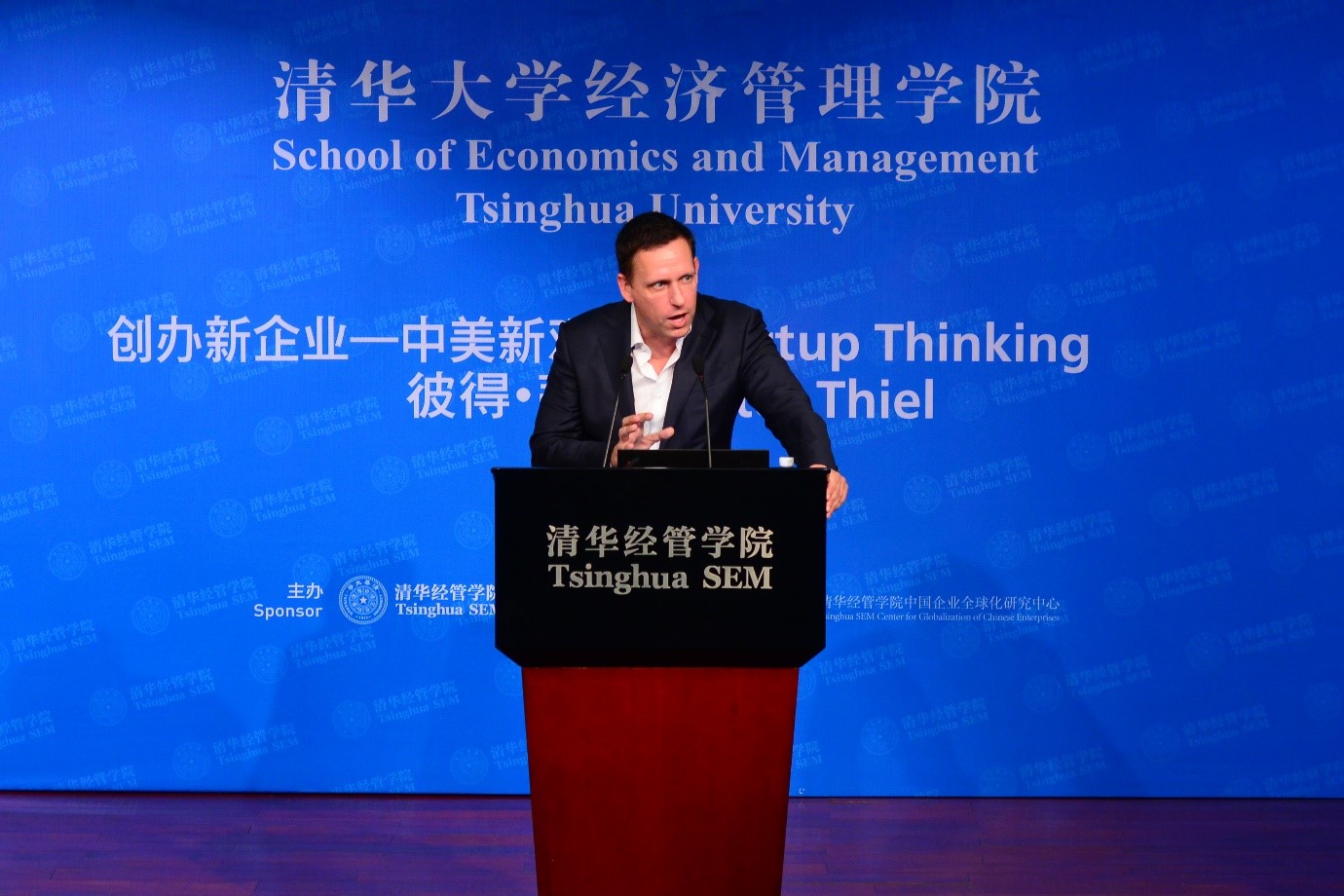
Peter Thiel engages in thoughtful dialogue with Tsinghua SEM Dean Qian.
Many people have different concepts of innovation. What is your definition of innovation?
PT:
It’s always hard to define, mostly you know it when you see it. A more
naïve definition is that it clearly transforms our civilization and
improves the living standards for many people in the years ahead. But
there are also many innovations that can be very subtle and still make a
very big difference over time.
DQ: Is it fair to say that you put innovation into 2 categories, one macro innovation and one micro innovation?
PT:
Yes, I am more interested in the macro, but it’s always hard to say.
Most people would have said Facebook was a very small thing and did not
matter that much although I think social networks have transformed the
nature of communications. We have a website at Founders Fund that says,
“We expected flying cars but all we got was 140 characters.” It is a
critique of Twitter where Twitter is doing so much less than a flying
car but I think that these new communications have had a significant
impact even for companies like Twitter that look very small but have had
a big impact and have been able to increase the GDP for the whole
civilization. As a venture capitalist I look for innovations that can
create great companies.
You may want to say micro-innovation for macro-impact?
PT:
Yes, sometimes macro-innovation has micro-impact, and sometimes
micro-innovation can have macro-impact, so it is difficult to predict in
advance. Sometimes things that look small turn out to be very big.
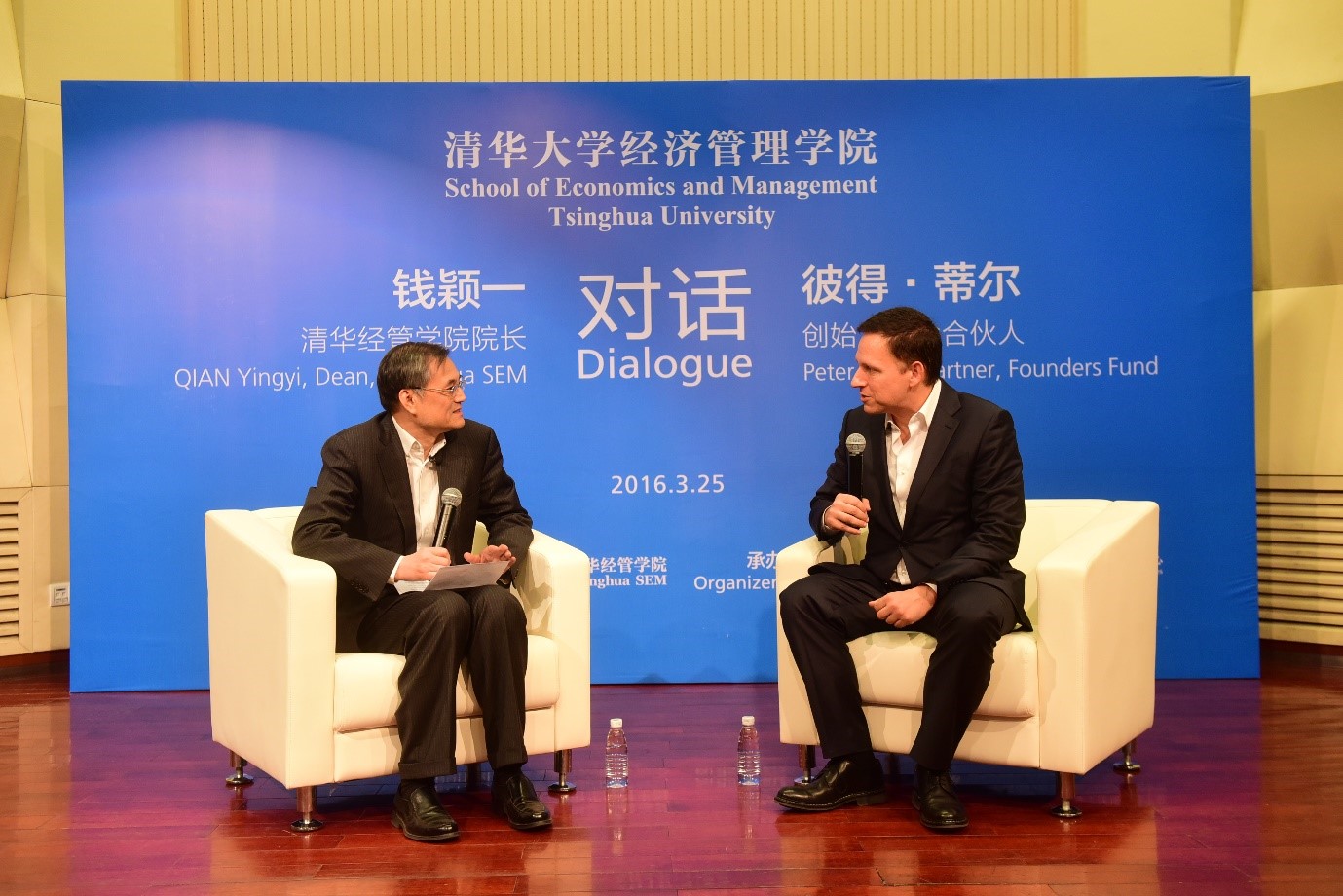
Dialogue between Qian Yingyi, Dean of Tsinghua SEM and Peter Thiel, Partner of Founders Fund
In terms of macro-impact in the civilization, what do you think are the most important innovations in the past 40 years?
PT:
In the last 40 years, it has been mainly around computers, internet,
software, semi-conductors. I think we had a lot of progress in that area
and somewhat less in other areas. There is a big debate whether there
is more innovation or relative stagnation of innovation. The word
technology has a different meaning today compared to 50 years ago.
Technology would have meant rockets, very fast airplanes, the green
revolution in agriculture, nuclear power and computers. Today,
technology usually means information technology. We have narrowed the
definition. The fact that the definition has narrowed tells us something
about the reality. I think it is a challenge because it would be good
for our civilization if it happened in other areas as well. Most people
in Silicon Valley think the opposite, most people are very optimistic
about it.
Productivity
growth is not going as fast as it used to be. There has been a slower
rate of productivity growth in the U.S., Western Europe, and Japan since
the late 1970s. People have debates on, “Is productivity not being
measured properly,” but also one could argue it has been measured too
much. I believe we tend to exaggerate the productivity because we use a
lot of information technology. We have the screens in front of us all
the time, but the smartphones that distract us all the time also
distract us from seeing that our environment has not changed. In the
U.S. or Western Europe, the subways are 100 years old, the cities have
not changed that much, and there has been limited progress made in other
dimensions.
DQ:
So there is a perception problem here where we use everyday cell phones
and it feels the world is changing so much but if you look around it
has not changed that much.
PT:
One of the challenges in Silicon Valley is that the people are biased
to be very bullish. If you are starting a company, you want to say it is
going to be very different. If you are a venture capitalist, you want
to say there are all those extraordinary technologies that are happening
that you can invest in. It is a natural bias.
It
has also been exacerbated by the bubbles in the late 1990s, and when it
collapsed, all people outside of Silicon Valley said the whole thing is
fake. So when people say there is not a lot of financial reward, they
think there is no technological innovation. This is what makes people in
Silicon Valley very defensive. There is always this link between the
rate of innovation and financial valuation. I believe these can be
decoupled. Even in a world of moderate innovation it can actually be
quite lucrative financially. If you do come up with something new, it is
very hard for other people to come up with something else. If you come
up with a new search engine like Google, there is no innovation in
search – nobody is coming up with a dramatically better search engine.
As a result, there is this monopoly that is very powerful. If we look at
disk drive manufacturing in the 1980s, you could come up with a better
disk drive than anybody else in the world and then two years later
someone else would have one that is better than yours. Therefore, your
company would go out of business. There has been large transformation in
terms of disk drives, but not so good for the companies. The
inelasticity for technology in a world of slow technology innovation may
be far more lucrative than in a world with a lot of technology
innovation. If you are a farmer in the middle of a famine, you may
actually do better than if you are a farmer in a period of extreme
plenty where so many people are doing things and the price is getting
depressed.
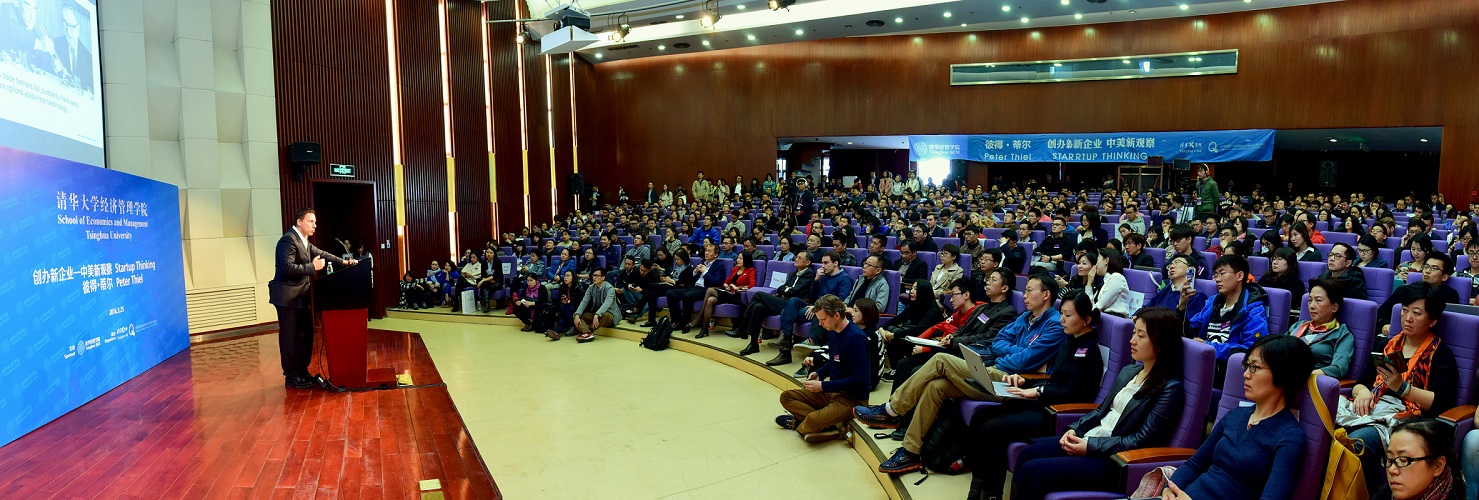
Mr. Thiel shares his insights on Startup Thinking with a standing-room only crowd of Tsinghua students and faculty.
Innovation is very valued around the world and in China. Why do you think this is the case?
I
would say it is even more recently, especially in the last ten years or
so. I think there are differences in the developed world and in China
perhaps. Starting with the visit of Kissinger in China in 1971 until
2007, there was a period of globalization by copying things that work,
and there was a lot that could be done just by globalization. In China,
it did not make much sense to innovate because there were so many
low-hanging fruits that could be copied. In the U.S., the industries
that were very linked to globalization like finance were the ones that
naturally did extremely well. Perhaps the globalization trend is not
quite as strong as it used to be anymore. I think it peaked in 2007.
Between 1971 and 2007 trade grew 2 to 3 times as fast as GDP; since 2007
it is about the same. It feels like it’s all going in reverse now. If
globalization was a way for talented people to do things, and now it no
longer is, then people need to move towards innovation.
There is a cultural indicator that illustrates this shift. In the 1987 anti-Wall Street movie Wall Street,
investment bankers were shown as being all evil and thieves, but all
the talented people at that time decided to become investment bankers.
The movie had the opposite effect. People wanted to go and work at Wall
Street.
There was a similar phenomenon with The Social Network about Facebook, which came out in 2010. We were extremely nervous at
Facebook about the movie. In May 2010, we had a board meeting, and we
spent the whole time talking about this horrible movie, that we should
have stopped the movie, maybe sue them, maybe sabotage them. We spent 8
hours talking about how should we stop the movie. But it was too late:
the movie came out in October 2010, and at that point we had to pretend
that it was going to be good. We rented out a theater so everybody at
Facebook went to see the movie and tried to put a good face on it. But
the movie got interpreted the opposite way, just like the Wall Street
movie. All those people watched the movie and said, this is so
inspiring, I want to be part of it.
This is one of the signals for the culture change.
Why 2007? Is it because of the financial crisis?
PT:
Certainly the banks were central to globalization, so the banks were
hurt the most from the financial crisis. You can also argue that the
crisis was caused by too much globalization. Money was spent on projects
that didn’t make sense. As globalization went too far, the financial
sector ran into difficulty. But I think it is more my explanation than
the standard one.
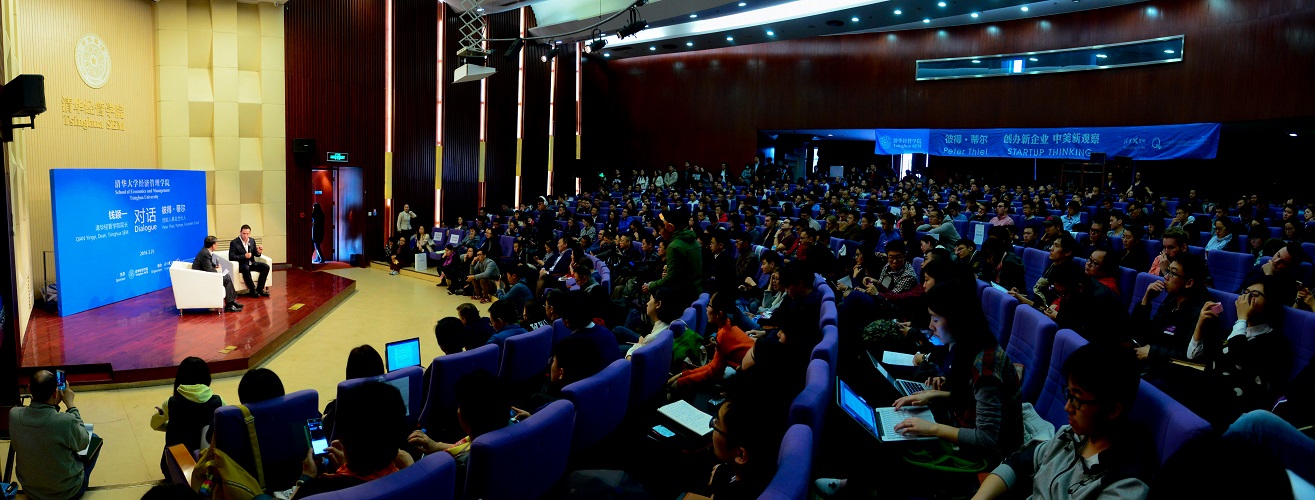
A raptly attentive audience soaks in Peter Thiel's unique, and at times contrarian, entrepreneurial perspectives.
This
is the first time I hear you saying that globalization went too far.
Usually people on the left argue against globalization but for different
reasons, but your argument sounds different.
PT:
The over-globalization is the product of a failure of imagination –
there was nothing else you could imagine except globalization. The only
future you could imagine was for the whole world to become the same. All
the resources were spent on this global arbitrage.
But
there are all sorts of globalizations. One is copying things that work.
It can also be movement of people, goods, money, information and
industries that are linked to these things. People and goods are under
the most pressure. This is why we have all those crazy phenomena like
Trump in the U.S. It is an underlying trend that somehow has reached its
limit.
As
a cultural description, NYC had this tagline, “If you can make it
there, you can make it anywhere.” So people were told that if you go and
conquer NYC, you conquer the whole world. That was the globalization
story. But it turned out, this was much harder than people thought, and
there were a lot of other people who were told the same thing. So you
are competing with all those people, and after working for 10-15 years,
you have not necessarily gotten your career any further.
So
this is what the future looked like, but it doesn’t mean it has to be
like that. Innovation can be key so the world doesn’t look the same
everywhere.
You
mentioned that in the past several decades, the Chinese economy has
grown very fast by copying the technology innovations from other
countries. Now the Chinese economy is slowing down; people say that
innovation is the way out for the Chinese economy to recover. In your
view, why is China valuing innovation so much today? What are the
differences in innovation between China and the U.S.?
PT:
I understand better the U.S. than I understand China. The really big
gains from globalization have already happened in China. It doesn’t mean
globalization should stop but the incremental gains from globalization
will not be as big as they were in recent years. Just like in the U.S.
and Europe, there is a need to do more innovation to grow vertically and
not just horizontally. The big difference in China is the scale. It is
an enormous country, and businesses need to get to scale to succeed. A
lot of innovation happened on business model innovation and a lot less
on scientific or technical breakthrough.
What will happen in the next 10-15 years?
My
view is that it will be less different from the U.S. than it has been
in the past. The need to do new things will be greater in China. One
could argue that China has still a much lower GDP per capita, and
therefore there is a lot of room to grow without innovating.
Germany
is the strongest European country and strongest on manufacturing. How
would you compare innovation from your home country to Germany?
PT:
I always think the difference between California and Germany is this
big contrast where people in California are very optimistic but very
desperate, and people in Germany are pessimistic but comfortable. The
question is always how will those places do going forward. People in
Germany are very nervous about the future. There are no real IT
companies in Germany, apart from the Rocket Internet which is less
innovative than any other company in China. People in Germany and Europe
tend to be very anti-technological. Although there is this critique
from the U.S. about China’s firewall from American companies, people in
China are not hostile to technology, whereas in Germany and Western
Europe, people are quite hostile to technology. If Mark Zuckerberg comes
to China, people are actually love him. In Germany, it is always quite
tough to him. There is a constant negativity around those companies like
Google, Facebook, Amazon in a way that is very different from China. In
China, it is a political issue, but in Europe it is a cultural issue.
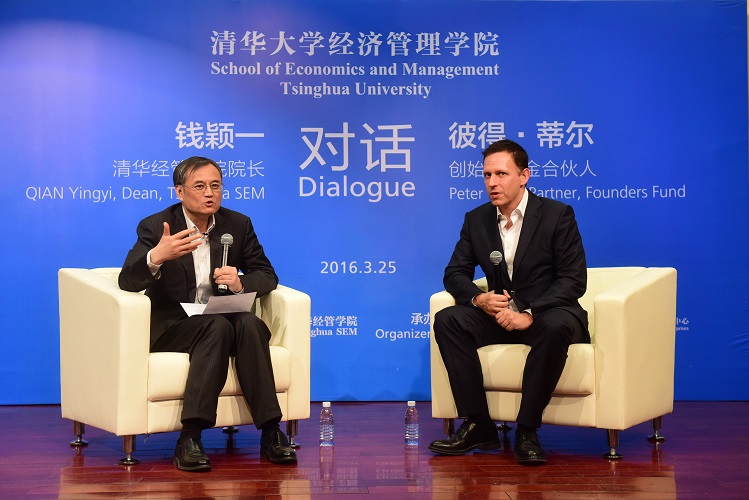
Dialogue between Qian Yingyi, Dean of Tsinghua SEM and Peter Thiel, Partner of Founders Fund
Where is the value being captured in the value chain?
For
example, think of Foxconn and Apple. Apple has a market capitalization
of around $550bn, and Foxconn has around $90bn. Usually, this would be a
duopoly, where Apple designs and Foxconn manufactures. It is strange
how Foxconn is only able to get so little of the value. I think a lot of
the value gets captured in Japan and in Germany where they build the
machines used by Foxconn. So there is a lot of the hidden value capture
going on in Japan and Germany. It is very difficult to anticipate how it
will change over time.
There
is a very famous curve called the “smiling curve” of the value chain
where the X is the type of value and Y is the profitability. A smiling
curve shows Design and R&D capture more value, followed by
manufacturing where less value is captured and then back to marketing
and services where more value is captured. This shows a smiling face.
Most businesses in China are in the manufacturing part and therefore
capture little value, compared to the U.S., Germany, or Japan where they
focus on Design or services and manage to capture more of the value.
This could be the future of Germany without embracing the internet.
You were mentioning how Western Europeans are not embracing technology. Do you think this could hamper their future?
PT:
It is always a challenge, but in general I don’t think it is a healthy
attitude because it can easily slip into anti-innovation. But there are
things that work much better in Europe than in the U.S. The governments
work much better. The U.S. has a government that works very badly. Basic
services don’t work. The education system in California is poor; the
public school system is catastrophic; the roads in San Francisco are
completely broken. So governance is much better in Europe than in the
U.S.
There
is a politically incorrect argument that I always do in Germany that
makes people very uncomfortable: there is no innovation because there
are not enough Jewish people. There was something about German culture
in the late 19th early 20th century where Germany was the country that had the closest link with
Jewish people, and there was a very symbiotic relationship, and it was
an incredibly generative dynamic that produced a lot of science and
technology and that was completely destroyed with WWII.
I think Israel would do better if there were more Germans, and Germany would do well if there were more Jewish people.
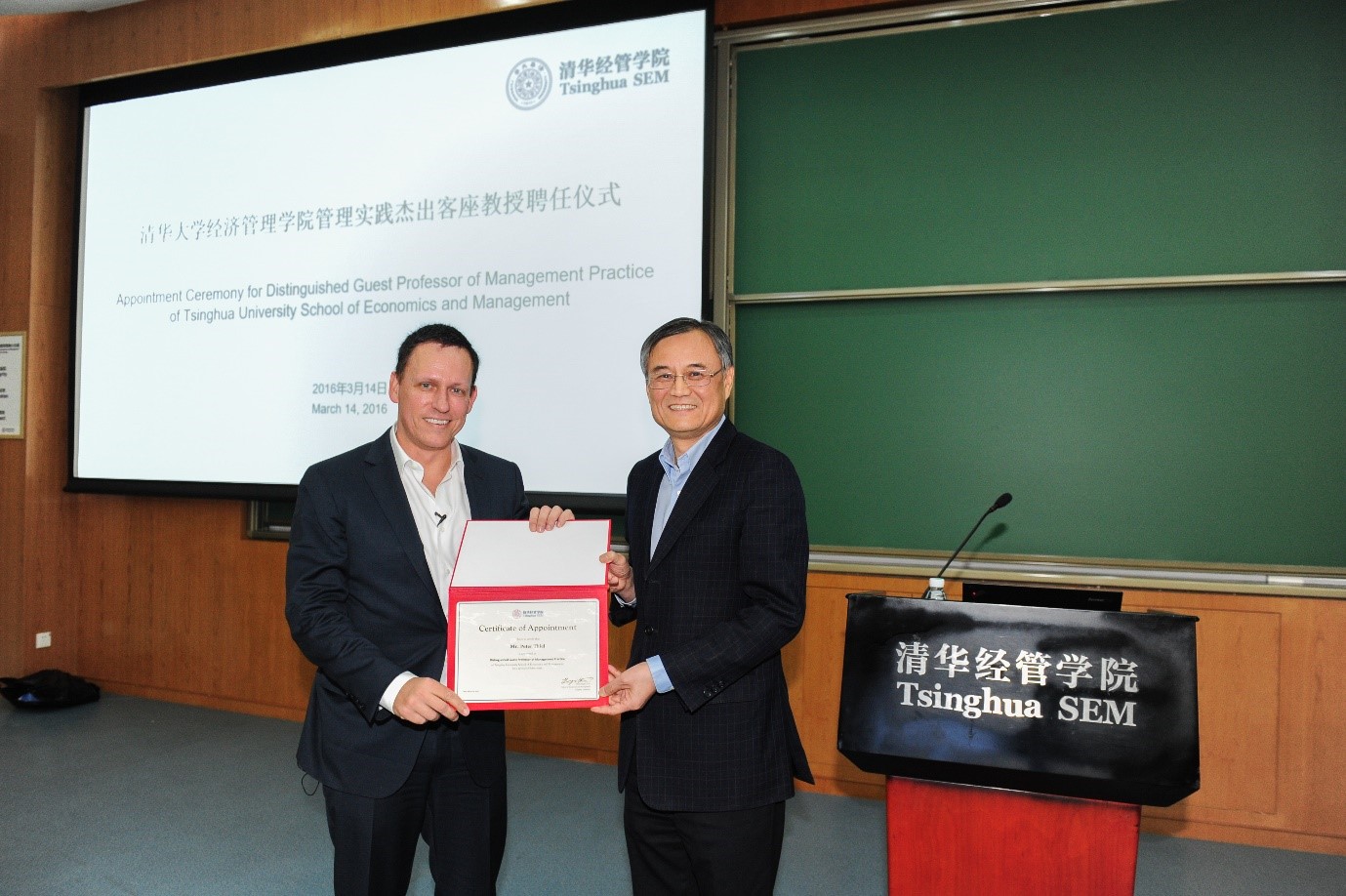
Presentation by Dean Qian of Tsinghua SEM's token of appreciation for Mr. Thiel's contributions.
What is the connection between innovation and education? Can education help boost innovation?
There
is some connection, but it is very complicated. I do think there is a
knowledge base that people need to get to. Most people that did well in
technology were reasonably smart and reasonably well educated. But then
the danger with education is that people are trained to do well on
tests. There is always the danger to make people too good at repeating
existing knowledge and not at the expense to try to do new things.
People
often say that Chinese schools do too much tracking of students. I
think it is also true in the U.S. I had a very unusual education
background. I went to an elite college at Stanford, but I went to public
high school in California, and it was not that intense. I had three
months’ vacation in the summer, and I could do whatever I wanted. I was
interested in math, so I got better at math. This freedom to explore
ideas is good. I think it is hard to achieve when education is too
intensely tracked. On the other hand, most people didn’t do anything
with that free time.
DQ:
In this debate about innovation and education, it is always interesting
to compare with India. Both have around 1 billion people and limited
resources, and therefore countries have to rely on tests. But then,
India and China used to be at very similar income levels 40 years ago,
and now China is in a better position. But in Silicon Valley, Indians
are better at software and Chinese at hardware. There was a question in
the class about why many Indians are promoted, but not Chinese. Your
answer was that founders have a much greater impact to change this
reality. There are many differences between the Chinese and Indians, but
let’s focus only on the education. Do you think there are many
differences between the Chinese and Indians’ education?
PT:
I think there is some difference, but I can’t locate it in the
education system. The education systems look very similar. I had not
realized this, but do Indians actually do better in Silicon Valley than
Chinese?
DQ:
A few examples: the CEOs of Google, Microsoft, Pepsi, and Visa are all
Indians, but there are no Chinese at that level. Also, the Deans of
Harvard Business School, Cornell, and Chicago Business School are all
Indians and no Chinese. I don’t think there is discrimination, but it is
a fact. Harvard Business School has 200 faculty members, 32 Indians and
only 2 Chinese. In Silicon Valley, there are 10,000 Tsinghua graduates,
5,000 from Peking University.
PT:
I think you are right, there is something with Silicon Valley about
this. This is a very important question that people in Silicon Valley
don’t ask. In the U.S., it is very taboo to make distinction on groups
or nations. This is actually the first time I ever heard this question;
therefore, I am inclined to think this is a much more important
question, because I know it never gets asked.
DQ:
I think language is the first reason people think about the difference
in success between Indians and Chinese in the U.S. But I think there
must be deeper reasons. I think it goes as deep as a mindset or
philosophy. I met Indian economists who had backgrounds in both
economics and philosophy. This is something that would never happen in
China. I think it is because India might be more spiritual. People say
India is part of Asia, but philosophically it is more similar to the
West.
PT:
I think the interesting question would be to compare Chinese and Jewish
people. Israel is very entrepreneurial just like China, but there is a
premium on being different from other people. Back in 2004 in Israel, I
met the mayor of Jerusalem Ehud Olmert. He told me as a joke to break
the ice: during a conversation between Eisenhower and Ben-Gurion in the
1950s, Eisenhower told Ben-Gurion, “You have no idea how hard it is to
be the President of a country with 180 million people.” Ben-Gurion
replied, “You have no idea how hard it is to the President of a country
with 3 million Presidents.”
I think this sums up quite well the Jewish culture.

Presentation by Dean Qian of Tsinghua SEM's token of appreciation for Mr. Thiel's contributions.
What should the government do to promote innovation?
PT:
I am so far from the system that it is quite hard to answer. As a very
abstract answer, it is good to see that China thinks innovation is
important. The questions around innovation seem to be more intense in
China than in Western Europe or the U.S. More specifically, it is
important to understand if there are too many regulations that make it
more difficult for companies to innovate. Culturally, it is important to
understand if it is culturally acceptable for people to fail. I don’t
think failure is a good thing, but it shouldn’t be so catastrophic that
it discourages people to take risks. I am always uncertain about how
much you can do directly. For example, it would not be a very good idea
for the government to set up a VC and just give money to everybody and
try to be successful.
DQ:
Some background information: China has two aspects that are not seen
anywhere else in the world. First, there is a strong government. Second,
a very enthusiastic government. They are eager to make innovation
successful. They set up industry funds, they build huge science parks,
they subsidize incubators. They even created the Chinese equivalent of
DARPA in the U.S.
PT:
I think DARPA worked extremely well in the 1950s and 60s but has been
much less innovative in the last 30-40 years. The way DARPA worked at
the beginning was one person giving money to 30 people they knew were
extremely smart and talented scientists. They didn’t have to write any
papers. It was quite top-down, but also with not much process or
bureaucracies. In the 1970s, they started to include more procedures to
make it more fair, and as the regulation was getting more intense, the
money ended up going to people who were good at gaming the process but
were not necessarily the good scientists. So the people who are good at
filling up grant applications get the money. That’s my theory about what
has gone wrong with government-driven R&D in the U.S. The challenge
is how to avoid this and get the money to the good scientists. This
issue in the U.S. has not been solved yet.
You
have been here in Beijing for two weeks at Tsinghua and came to China
several times before. Do you see Beijing becoming a new Silicon Valley?
What do you think will happen in the next 10-15 years?
Beijing
will probably be the most innovative city in the world after Silicon
Valley. The most innovative and technological companies are here in
Beijing. Innovation has been very concentrated in Silicon Valley for the
last 10 years, and I think it will be less concentrated in the next 10
years. So I think innovation will not only happen in Silicon Valley, not
only in Beijing, but in many other places. There is no magic soil for
innovation to happen. People exaggerate this about Silicon Valley.
Do you see the potential for Chinese companies to create synergies between Beijing and Silicon Valley and go from 0 to 1?
PT:
I think there is both more of a possibility and of a need. The big
trend of globalization is going to be less powerful. So there is a need
for more innovation, including in China.
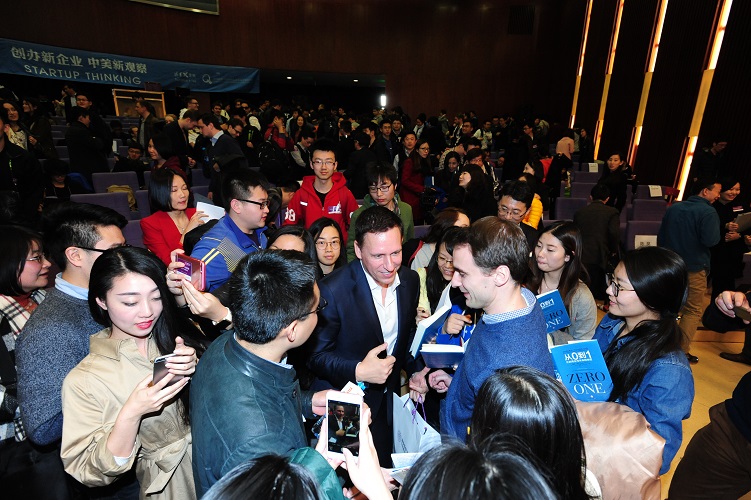
Mr. Thiel graciously engaeges students in individual-level conversation.
How to think Tsinghua can help new entrepreneurs going from 0 to 1?
PT:
I am never sure it is possible to do it directly. Stanford did not do
this directly. There was flexibility for faculty members to be advisors
to companies.
DQ:
There is the illusion here in China that Stanford plays a major role in
creating this innovation, but you are saying that this happened only
indirectly.
PT:
A lot of founders were students at Stanford, so there is definitely
some link to Stanford, but it was not something that could be pushed.
For example, Stanford works much better than Harvard. I think it is
because Stanford is quite good at creating an environment for people to
create relationships. Many of the founders had good relationships while
at college. Harvard is somehow a much more hostile place. MIT and
Caltech are also very hostile places. People have to fight really hard,
and there is less teamwork. Building good relationships is very
important to create start-ups.
I
know Tsinghua has a big incubator, and this is much more difficult to
replicate in the U.S. In the U.S., there is already a clear leader with
Y-Combinator, and therefore it might be hard for American universities
to compete. In China, the situation is different: there might be a place
for an incubator at Tsinghua to establish itself as the leader in the
market, especially in the harder science or technological fields.
I
don’t want to exaggerate the role of universities. Because if you say
that it was all driven by Stanford, then you would copy all sorts of
things that didn’t even work. It’s not obvious why Silicon Valley
worked. I think sometimes it has to do with history, where there are
some role models to follow, and this helps a lot. Both Silicon Valley
and Beijing have many role models who can attract people. This is very
powerful. For example, this is completely missing in Germany, and I am
not sure who they would be choose as an entrepreneur role model.
You
are investing in Artificial Intelligence, and you don’t seem as worried
as Elon Musk about it. What are the differences and when will we reach
the singularity?
PT:
I think these technologies are quite important. I also think they can
be quite dangerous, so we need to think about it very hard. My guess is
that the generalized AI is very far in the future. AI is an ambiguous
concept; it can mean the next generation of computers, or it can mean
the last generation of computers. If there is generalized AI, humans
don’t need to do any more thinking, because computers would be so smart
that all the innovation would happen through AI. I think our intuition
about generalized AI is very poor. I think people have no clear answers
to this, so it is very confusing. On the other hand, narrow AI is only
focused on one task, just like the AlphaGo from Google. I think narrow
AI is just the continuation of the information age where computers get
better than humans at specific tasks, and it is simply positive.
Generalized AI is very strange – could be dangerous – but I think it is
very far in the future, and I am not that worried about it.
Ray
Kurzweil says the singularity will be reached by 2045. It is hard to
know when one has good intuition about it. I think it has been
over-predicted for a long time. In the 1970s people predicted we will be
having AI 20-30 years later. There is a tendency for people to
overstate it. There is also the tendency to understate it because it is
so strange that we have no good models for it.

Peter Thiel and Dean Qian join an enthusiastic audience for a post-dialogue photo-op.